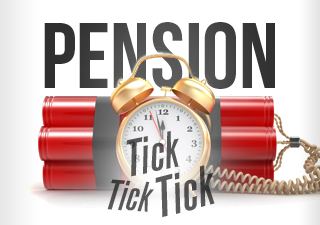Commentary

Pension Bomb to Hit Pennsylvania Families
Are you ready to pay an additional $1,000 in state and local taxes alone? Prepared to see your child’s teacher laid off? Thanks to bad promises politicians made to good people, a pension crisis facing Pennsylvania threatens our American way of life, homes, cities and schools.
Already, nearly 6,000 classroom teachers in Pennsylvania public schools received pink slips over the past two school years. This unprecedented trend, following years in staff growth, will likely worsen due to skyrocketing pension costs with no financial safety net built in to protect good teachers.
What’s more, homeowners will get socked with the pension bomb too—for benefits that were promised by politicians but never paid for. School districts’ pension payments (which only cover half the required payments) will rise substantially over the next four years. For school districts across the state, that cost increase comes to approximately $346 per homeowner. But those local cost increases will vary by district, from as low as $102 in Saint Clair Area district to $882 per homeowner in Reading city school district.
As scary as that seems, it is but the tip of this woeful economic iceberg. State government’s pension costs (for state employees and half of school employees’ pensions) are expected to rise by more than $2.5 billion over the next four years—or $523 annually per household.
That is, many families will pay more than $1,000 in additional taxes for pension debt we accumulated over the past decade, and get nothing more for their money.
So how did we get into this mess? Very simply, it is the culmination of a series of bad politics and policy decisions.
In 2001, following an economic boom, politicians thought pensions were well-funded and stock market gains would continue indefinitely, so they decided to boost pension benefits for themselves and government workers—even doing so retroactively. When the stock market dropped, lawmakers erred again by voting to put off paying for those losses for years.
Those bills are now coming due, and exacerbated by the big investment losses in 2008. But one can understand why lawmakers made the choices they did. There’s a big political payoff for boosting benefits as government unions lobbied heavily for those changes.
And there’s little downside to delaying payments (with government unions lobbying for those changes, too). Those costs will be paid through generational theft, foisted upon our children and grandchildren, who are still too young to vote.
Ultimately, the only solution is to get politics out of pensions. This can only happen by moving from traditional pensions, where taxpayers provide a guaranteed government income for life, to a retirement plan popular in the private sector, similar to a 401(k).
In a 401(k), which most private companies switched to decades ago, lawmakers can’t play politics. If they promise to contribute six percent of salary, they must put that in, and can’t defer those costs to our kids and grandkids. Further, 401(k)-style plans are predictable for elected officials, allowing them to plan for all costs and avoid massive property tax hikes, and they’re affordable for taxpayers.
Moreover, 401(k) plans offer more convenience for workers. Younger workers especially will benefit from the ability to take a 401(k) with them as they change jobs instead of forfeiting retirement savings to advance their career. Older adults can pass their remaining 401(k) onto their children, whereas pension payouts end when retirees die, even if they paid in more than they collected. And all workers will benefit from a sustainable retirement system that will actually be there when they retire.
Legislation sponsored by Sen. Pat Browne (R-Lehigh County) last session would place all new state and school employees in a 401(k)-style retirement plan. As they say, “when you’re in a hole, stop digging,” and this legislation would stop digging a deeper pension hole and empower new government employees to have ownership over their retirement.
However, this reform doesn’t pay off the pension shortfall we’ve already built up by overpromising pensions. These costs will continue to burden state taxpayers, schools and local governments for years.
Lawmakers must recognize the impact the pension bomb will have on Pennsylvania, and show courage to defuse it before the fallout reaches our already stressed families. They must resist the urge to repeat the spending splurge of years past, create new programs, or throw money at problems. Moreover, to find funding for pensions without raising taxes on working families, lawmakers must find significant savings through prevailing wage reform, ending corporate welfare, and tackling bloated and wasteful welfare spending.
Today, the pension bomb facing Pennsylvania threatens homeowners with massive tax hikes and school teachers and other government workers with layoffs. If our children and grandchildren are to have a prosperous tomorrow, they can’t afford any more missteps from their leaders. Defusing the pension bomb, for their sake, must be job number one for state lawmakers this year.
# # #
Nathan A. Benefield is director of policy analysis for Commonwealth Foundation, Pennsylvania’s free-market think tank (www.commonwealthfoundation.org.)